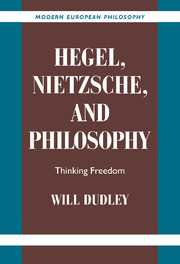Book contents
- Frontmatter
- Contents
- Acknowledgments
- List of Texts, Translations, and Abbreviations
- Introduction: Freedom and Philosophy
- PART I FREEDOM IN AND THROUGH HEGEL'S PHILOSOPHY
- 1 The Place of Freedom in Hegel's Philosophy
- 2 The Freedom of Willing: Hegel's Philosophy of Right
- 3 Freedom beyond Willing: From the Philosophy of Right to Absolute Spirit
- 4 Freedom through Hegel's Philosophy
- PART II FREEDOM IN AND THROUGH NIETZSCHE'S PHILOSOPHY
- Conclusion: Philosophy and Freedom
- Notes
- Index
4 - Freedom through Hegel's Philosophy
Published online by Cambridge University Press: 09 July 2009
- Frontmatter
- Contents
- Acknowledgments
- List of Texts, Translations, and Abbreviations
- Introduction: Freedom and Philosophy
- PART I FREEDOM IN AND THROUGH HEGEL'S PHILOSOPHY
- 1 The Place of Freedom in Hegel's Philosophy
- 2 The Freedom of Willing: Hegel's Philosophy of Right
- 3 Freedom beyond Willing: From the Philosophy of Right to Absolute Spirit
- 4 Freedom through Hegel's Philosophy
- PART II FREEDOM IN AND THROUGH NIETZSCHE'S PHILOSOPHY
- Conclusion: Philosophy and Freedom
- Notes
- Index
Summary
Art, Religion, and Philosophy: Overcoming the Subjectivity of Willing
Hegel thinks that all three activities considered in absolute spirit – art, religion, and philosophy overcome the subjectivity of willing, the first sense in which it is finite; all of them, that is, overcome the presupposition (common to both subjective and objective spirit) that spiritual beings and the natural world, subject and object, are fundamentally alien to each other. In the theoretical activity of knowing, recall, the contents of the natural world are understood to be imposed on a receptive spiritual subject. And in the practical activity of willing, spiritual contents are understood to be imposed on an indifferent natural world. The activities of absolute spirit, however, are precisely those in which spiritual subjects come to understand that the theoretical and practical presumption of the mutual alienation of the spiritual and the natural must be false, for only if the spiritual subject and the natural world are always already reconciled is it possible for successful knowing and willing to take place. Art, religion, and philosophy, that is, show spiritual beings that the very condition of the possibility of the theoretical and practical activities through which they strive to unify the determinations of thought and being is that thought and being must have always already been unified. In the activities of absolute spirit, then, spiritual beings recognize that the unity of the spiritual and the natural is not merely made but also found.
- Type
- Chapter
- Information
- Hegel, Nietzsche, and PhilosophyThinking Freedom, pp. 101 - 120Publisher: Cambridge University PressPrint publication year: 2002

